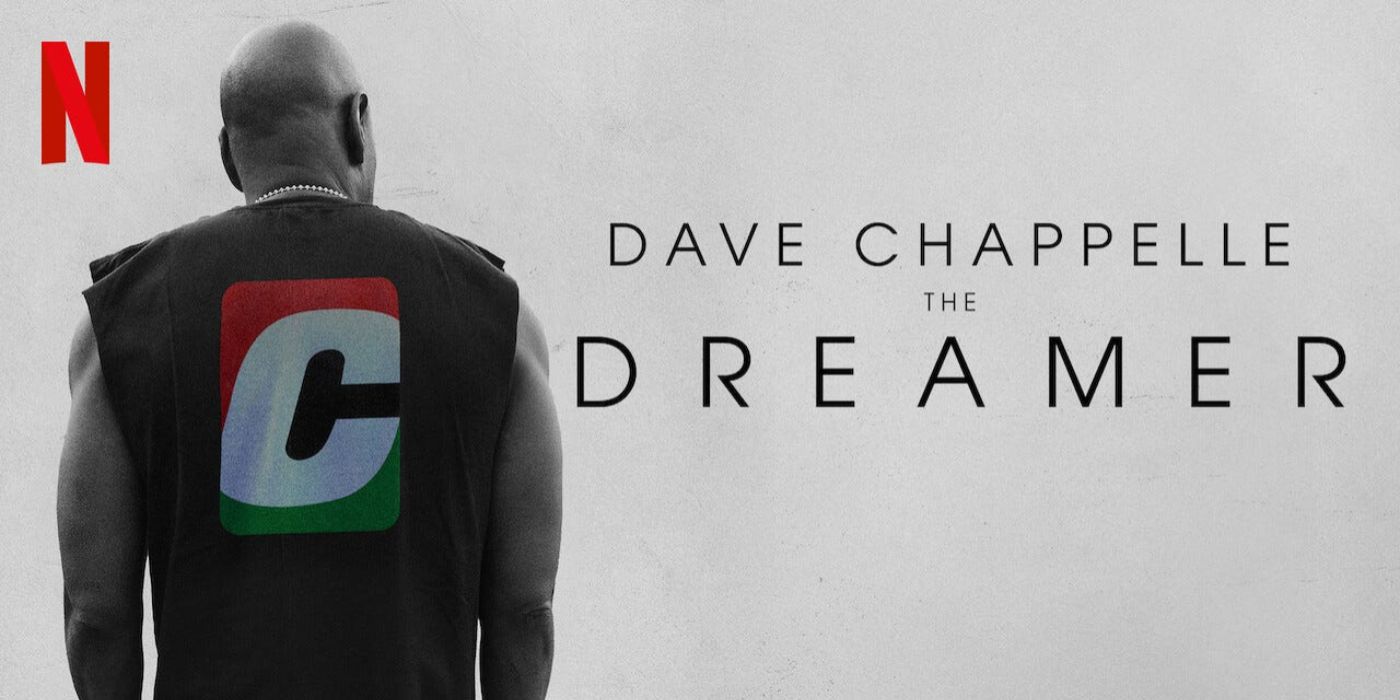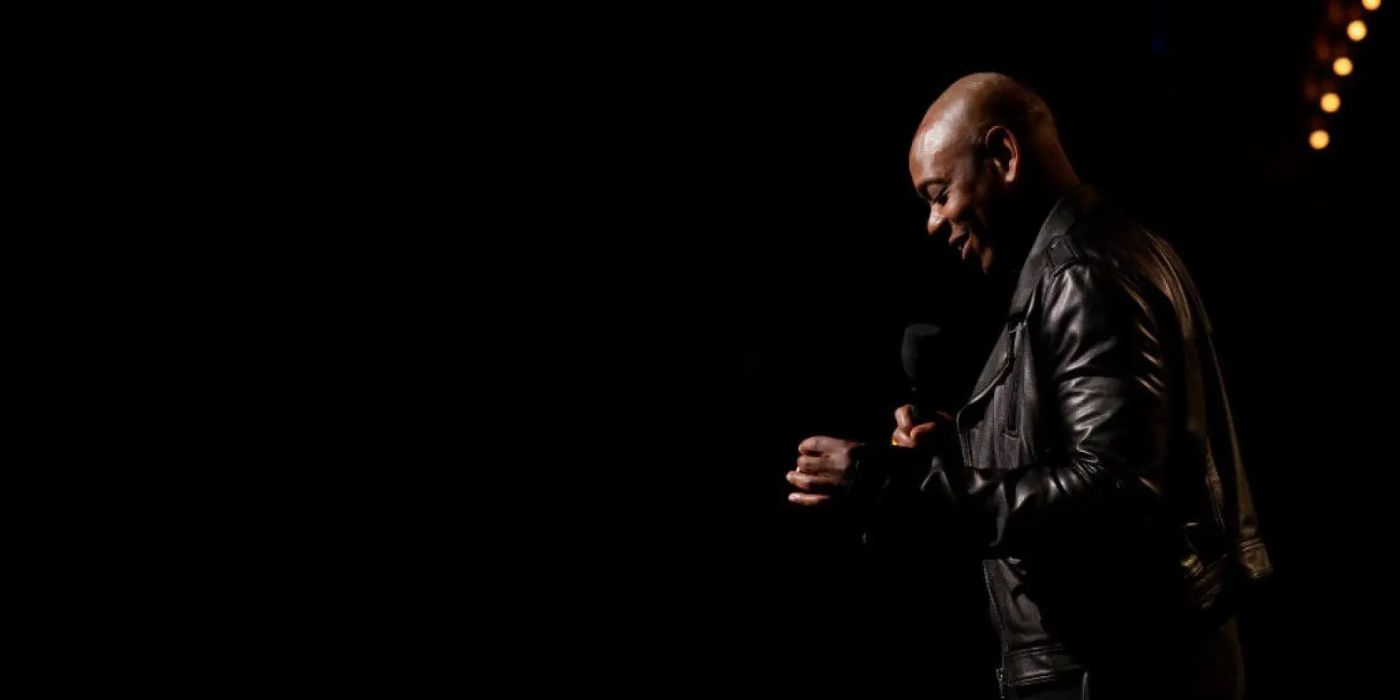Comedy is one of the most subjective things in the world. So, if you find the following opinion offensive or frustrating, then you feel the same as many people feel about some comedians themselves. Getting upset over someone’s opinion about comedy is more counter-productive than being upset about the comedy itself.
Dave Chappelle is one of the greats, but his new Netflix special, The Dreamer, is not. And this is coming from someone who has actually enjoyed most of Chappelle’s Netflix comedy up til now, and especially his most recent Saturday Night Live monologue. The Dreamer mostly features Chappelle going behind the scenes of Chris Rock’s ‘Oscar Slap’ and their massive Hollywood Bowl performance where someone rushed the stage to attack Chappelle. He name-drops Jim Carrey, Norm MacDonald, Jamie Foxx, Puff Daddy, Jon Stewart, and many more. Ultimately, it’s like he’s selling details to the tabloids.
Taken as objectively as possible and without moral or political bias (i.e. without ‘joke policing’), this is probably the first Chappelle special to be a genuine failure. Outside the self-aggrandizing stories about his celebrity experiences, Chappelle takes the weakest elements of his earlier specials (the most poorly constructed LGBTQ+ jokes which are akin to pointing and laughing at someone different) and scatters them throughout all of The Dreamer. The jokes are hack, or not jokes at all; multiple ‘laughs’ just come from white people who are happy to hear him say ‘the n-word.’ The worst part, however, is how the special is bookended by long and eventually pointless stories.
Pointless Diversions and Scrambled Messages
The Dreamer begins and ends with long stories that build to punchlines; the opening is much tighter, but the closing story is a complete mess and it lasts an interminable 20 minutes. He discusses the problems with filming a half-hour for HBO, and how noise from a downstairs club disrupted the recording and led to an infuriated young Chappelle getting into a conversation with the Russian mob.
See, the whole point is that Chappelle is, as the title implies, a dreamer, and that someone with intense dreams and utter commitment will be the most powerful person in the room. He then contradicts himself by imagining children who dream of what they ‘want to be when they grow up.’ A child wants to be a firefighter but sets fire to a building and burns people alive. A kid wants to be the President of the United States but becomes a father at 16 and then kills himself rather than climb the ladder at Walmart. It all leads to Chappelle admitting that Lil Nas X is one of the most powerful dreamers he’s ever met — insert gay joke.
What is the point? Chappelle essentially ends the special by saying that he is not just a dreamer, but that he is honored to be a part of his audience’s dreams. Meanwhile, in his story, two dreamers have horrible lives and one of them gives Satan fellacio in the music video for “Montero (Call Me by Your Name).” Again, what the hell is he talking about?
It’s not like Chappelle doesn’t know how to tell a story; he’s one of the most masterful orators in recent history. He ended The Closer, a previous Netflix special, with an incredible story about one of his friends, a trans woman. It’s an emotional, deeply compassionate, and very funny story that shows the best of Chappelle as a humanist. It’s a beautiful moment where people are acknowledged as such, and not beyond any other identifier (except, perhaps, how funny they are). But real humanists don’t hide behind the curtain of “equal-opportunity offender” and don’t automatically insinuate one type of person as being ‘other,’ or ‘gross,’ or ‘not natural.’ Which leads us to the opening of The Dreamer.
The Lowest Common Denominator of Jokes
Chappelle begins the special by describing the distraught state he was in after his father died, and how the great Norm MacDonald cheered him up by introducing him to a hero of Chappelle’s, Jim Carrey. As luck would have it, though (and as Norm probably knew with mischievous glee), Carrey was deep into method acting as famed comedian Andy Kaufman for Milos Forman’s film, Man in the Moon. So Chappelle didn’t get to meet Carrey; he met Carrey-as-Kaufman. Then the punchline — this is how trans people make him feel.
It’s a basic joke setup with misdirection and memoir, but if you think about it, this doesn’t add up to anything more than the bigoted belief that trans people are just acting like other people. Without going into the whole Judith Butler notion of performative gender (which was likely not on Chappelle’s mind with the joke), suffice it to say, it’s an extremely lame and overlong opening. In fact, it seems like it exists just for Chappelle to say the word “trans” and get some applause, as if he’s thinking, “Well, I have to acknowledge all the bad press I’ve gotten for being labeled a transphobe, and I have to show how defiantly cheeky I am.” At its worst, the opening seems like applause-fishing.
And in many ways, that’s what a lot of Netflix-era Chappelle feels like. As Hasan Piker wisely said, Chappele is “the Hannah Gadsby of being transphobic.” It’s an unfortunate side effect of the past seven years that has affected comedy on the far left and on the far right — some comedians don’t want laughter, they want applause. They want to show that ‘they just went there.’ It’s the lowest-common-denominator of comedy where people like Greg Gutfeld and Bill Maher smugly reside. It’s no longer about jokes, it’s about being ‘right’ or about intentionally ‘triggering’ the opposing political side. It’s lame and uninteresting.
Let’s Talk Trans and Norm MacDonald
Really, the opening is one of the few times Dave Chappelle makes a trans joke; contrary to popular belief, he didn’t make The Dreamer just to insult more LGBTQ+ individuals. Hopefully it’s the last he makes, because by now he seems nearly incapable of crafting an intelligent and thoughtful joke like that. His trans jokes are the same as Steven Crowder’s and The Babylon Bee’s — a lazy twist on the concept of pronouns and what someone identifies as. It’s the same two jokes, or it’s just outright cruelty amounting to him squirming and screeching, “Ew, yuck!” Both are offensive because both are banal and thoughtless.
Chappelle should’ve heeded Norm’s words of wisdom about those kinds of trans jokes. MacDonald intentionally left out a joke about Caitlyn Jenner from his last comedy special because he knew it was too lazy. Here’s his conversation about it with Slate:
“The other thing was a joke about Caitlyn Jenner which, as a matter of fact, was a joke I’d deliberately left out of the Netflix special […] In that joke, I went to great lengths to say you should love Caitlyn Jenner and accept her, but you don’t have to pretend she’s beautiful. There’s no reason to do that. That was the entire point of the joke. It was pretty weak. So I won’t do those jokes anymore. Which is fine, because the reason I didn’t do the joke on the special is because I came to an understanding that other people came to much sooner than I did.
Which is what?
Which is that a lot of people are idiots. You don’t want to have a joke be misunderstood and then someone goes and beats up a trans person.”
I’m of the belief that you can tell a joke about anything; if it’s poorly crafted and communicated, however, you probably deserve the flack. If it’s poorly crafted and communicated, and it’s about a group of people who have higher suicide rates than any other and whose rights are continuously stripped away or under attack, then you definitely deserve the flack. Chappelle balanced out the weak transphobic material of earlier specials with some funny, insightful, and occasionally moving commentary. In The Dreamer, he opens with his weakest joke, and it goes downhill from there.
Stream The Dreamer on Netflix below:











